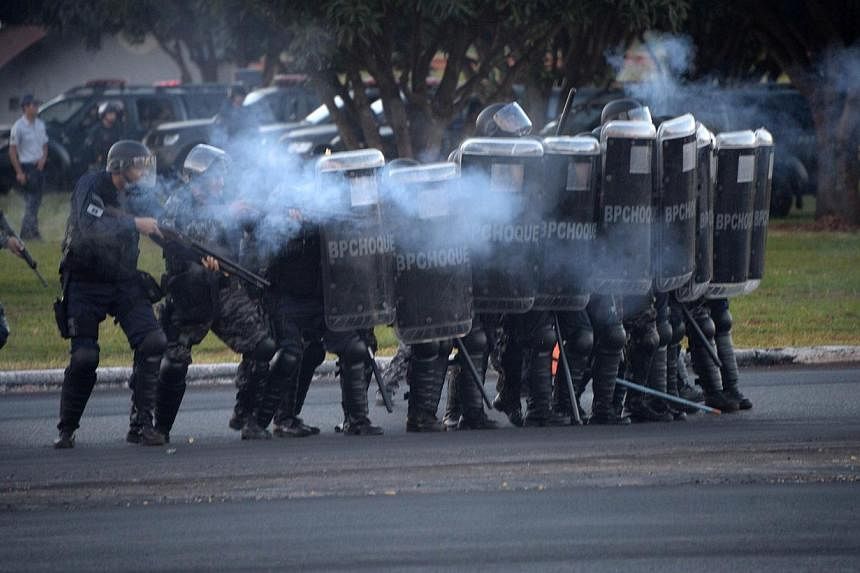BRASïLIA (AFP) - Police in the Brazilian capital fired tear gas on Tuesday to break up a protest by Indian chiefs and groups opposed to the money being spent to host the World Cup.
About 1,000 protesters rallying for causes ranging from indigenous rights to housing for the homeless gathered in Brasilia's government square and began marching toward the city's World Cup stadium.
After police fired tear gas, some Indians could be seen throwing stones at some of the 500 police encircling the stadium.
Protesters also continued to block roads around the government plaza, where the congress, presidential palace and Supreme Court are located.
Earlier, about 500 Indian leaders scaled the congress building and installed themselves on the roof, wearing traditional face paint and feathers and carrying bows and arrows, in a protest they said was aimed at protecting their rights.
The group, which brought together 100 ethnic groups from across Brazil, included Kayapo chief Raoni, an 84-year-old leader famous for fighting to protect the Amazon rainforest alongside pop music star Sting.
"Scaling the congress building was an act of bravery, it shows we're warriors who defend our rights," Mr Tamalui Kuikuru, an indigenous leader from the Xingu region in Mato Grosso state, told AFP.
The Indians soon came down from the roof and rejoined the rest of the protesters along the main avenue where Brazil's government ministries are located.
"Who is the Cup for? Not us!" shouted demonstrators. "I don't want the Cup, I want money for health and education."
Indians in Brazil have staged a series of protests in recent months, accusing President Dilma Rousseff's government of slowing the demarcation of their ancestral lands and creating policies that favor large-scale farming.
In the run-up to the World Cup, which opens on June 12, Brazil has also faced a wave of demonstrations by protesters angry over the more than US$11-billion (S$13.8 billion) budget for the tournament, which they say should have been spent on programmes to benefit the poor.
The indigenous leaders, who opened their protest with traditional prayers and drumming, aligned themselves to the broader anti-World Cup cause.
"Before organising the World Cup, Brazil should have thought more about health, education and housing," said Neguinho Truka, a leader of the Truka people in the northern state of Pernambuco who was wearing a traditional headdress of red and blue feathers.
Last year when Brazil hosted the Confederations Cup - a World Cup dress rehearsal - protests brought a million people into the streets and turned violent at times, to the embarrassment of tournament organizers.
Since then the protests have drawn smaller numbers but grown more radical. In recent weeks they have mainly been organized by unions, leftist parties and activist groups such as the Landless Movement (MST) and the Homeless Workers' Movement (MTST), which was present at Tuesday's protest.
Brazil has also been hit by a series of strikes ahead of the World Cup and a presidential election in October, including by police, teachers, bus drivers and bank security guards.

